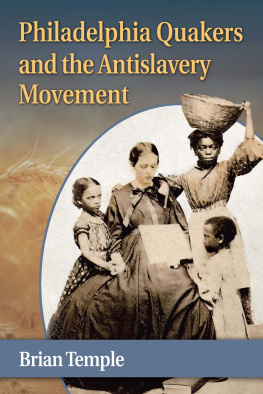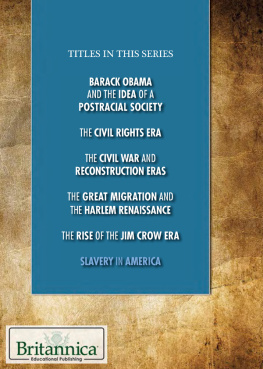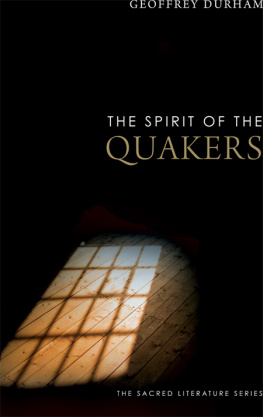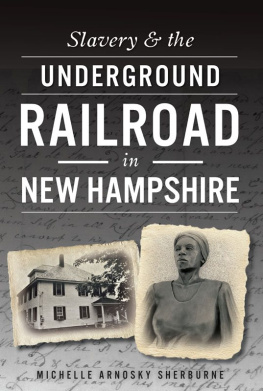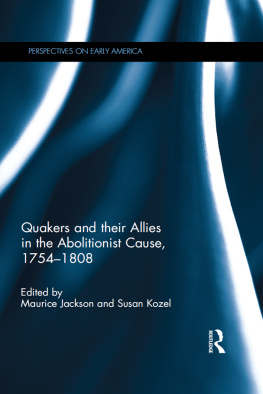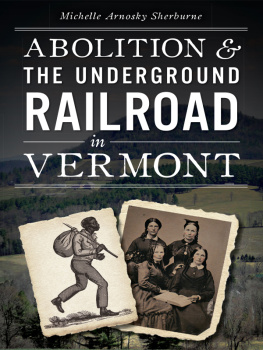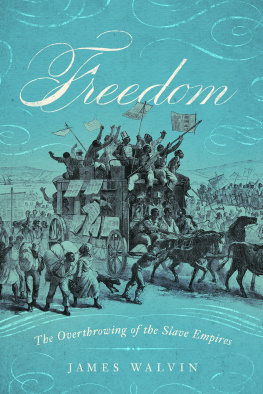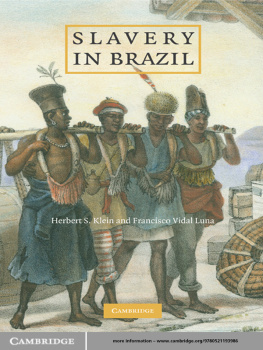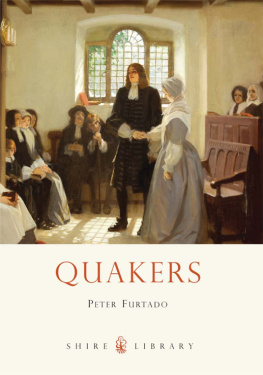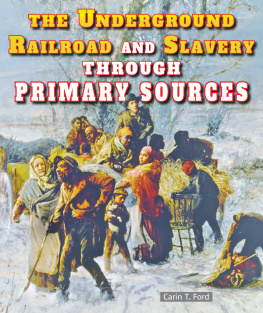
Also by Brian Temple
The Union Prison at Fort Delaware: A Perfect Hell on Earth (McFarland, 2003; paperback 2012)
Philadelphia Quakers and the Antislavery Movement
Brian Temple

McFarland & Company, Inc., Publishers
Jefferson, North Carolina
LIBRARY OF CONGRESS CATALOGUING DATA ARE AVAILABLE
BRITISH LIBRARY CATALOGUING DATA ARE AVAILABLE
e-ISBN: 978-1-4766-1577-6
2014 Brian Temple. All rights reserved
No part of this book may be reproduced or transmitted in any form or by any means, electronic or mechanical, including photocopying or recording, or by any information storage and retrieval system, without permission in writing from the publisher.
On the cover: Slaves Learning by H.C. Phillips & Bro., ca. 1863 (Friends Historical Library of Swarthmore College, Pennsylvania)
McFarland & Company, Inc., Publishers
Box 611, Jefferson, North Carolina 28640
www.mcfarlandpub.com
To Sarah and Lauren.
No father could be prouder.
Preface
When I was about eight years old, my grandparents and I drove through the city of Salem, New Jersey. As we went past an old house on the main street, my grandmother pointed at it and said that it was part of the Underground Railroad. I didnt really know what the Underground Railroad was and I was a little confused about what she meant. I thought it was a strange place to put a railroad.
Many years later, a friend of my wife mentioned to her that the Quakers were very influential in the early history of our area and maybe I could write something about them. I thought I would be polite and look into them. I soon learned that the Quakers were fair in their treatment of the Native American tribes they came into contact with, had a far more liberal approach in their dealings with women than the rest of the country during the 18th and 19th centuries, and were early opponents of slavery. They were also so involved with the development of the Delaware Valley (Pennsylvania, New Jersey, and Delaware) that I thought that they were rather active for a group of pacifists.
To narrow the field that I was going to research, I needed a focal point. I decided to focus on the Quakers attitude toward slavery. Many Quakers started out owning slaves and eventually the group became a strong opponent of slavery. Such a contrast interested me. It sounded like the Bible verse that said to remove the plank from your own eye before you remove the speck from anothers eye. That brought everything into focus.
The more I delved into the Quakers and slavery, the more contrasts appeared. Not every member of the Underground Railroad was a Quaker and not every Quaker was involved in the railroad or even in the antislavery movement. There was another contrast that is not always discussed and that is while the Quakers grew to believe that slavery was wrong, it did not always translate into true equality. There were some Quakers who invited African Americans into their homes and others who demanded that they sit on segregated benches at the Quaker meetings.
I was also surprised that more books did not mention the many ways the Quakers fought slavery beyond the Underground Railroad. They routinely petitioned state and federal governments to protest the slave trade and slavery and used existing laws to help slaves gain their freedom. Some of those stories are as exciting as those of the Underground Railroad.
I have many people and organizations to thank for the information in this book. The Gloucester County (New Jersey), Rowan University, and particularly the Swarthmore College libraries were very helpful. Also, the Burlington, Gloucester and Salem County (New Jersey) and Greenwich and Haddonfield (New Jersey) historical societies and their personnel were very giving of their time and knowledge. Id like to thank Sandy Ridgeway and Jim Merel for pointing me in the right direction and my wife Martha for keeping me there. Finally, Id like to thank my grandmother Josephine Phillips for pointing out that old house so long ago.
Prologue
Tide Mill sat on a hill overlooking Mannington Creek near Salem, New Jersey. George Abbott, a member of the Society of Friends, also known as Quakers, built the house in 1845 for his bride. Occasionally, late at night, there would be boats traveling the waters near Tide Mill. The contents of these boats were not visible, but those who waited on the New Jersey shore for their arrival already knew who was coming. A blue light over a yellow light on a boat signaled that the boat was carrying escaped slaves.
In Reflections of Ruth Abbott Rogers, she mentions an incident that occurred at Tide Mill. Her father once stumbled onto an escapee hiding in a hay mow. He ran to tell his father and when he did, George Abbott told his son to just forget about it.
That was not necessarily bad advice. Laws against helping runaway slaves had been in effect since 1793 and anyone trying to help someone escape could risk prosecution from the authorities. Since he was a Quaker, Abbott also risked getting into trouble from the Society of Friends. Slavery had been banned from the Quakers for almost one hundred years, but they also did not openly defy the laws of the land.
George Abbott was a member of the Underground Railroad, a loose confederation of people, Quaker and nonQuaker alike, who hid and helped those who tried to escape from slavery. Why would anyone, especially those belonging to a religious organization known to avoid conflict, risk their wealth and standing in the community to help strangers who were persecuted and forced to conform to the standards of others? To understand why Abbott and other Quakers, known for their pacifist beliefs, were so active in fighting slavery, it is necessary to go back to their beginnings.
Part I
Removing the Plank
1.Quaker Beginnings
Frustration is a powerful tool to enact social change. Its one thing to not like the world around you. Its quite another to actually work towards changing it. One such person was George Fox. At first glance, he might not seem someone who would rebel against the status quo. During his formative years, he was much more serious than his peers. His mother had the reputation of an upright woman and his father was called a Righteous Christer by their neighbors. In spite of Georges strongly religious background, he had questions concerning the worship of God. What really troubled him were the divisions existing in organized religion in England during the first half of the 17th century. In 1643, at the age of 19, Fox left his home in Leicestershire and began to wander in the hope of finding a religious path that he felt was the right one. He visited many members of the clergy and laypeople of different denominations, talking with them and asking questions. However, he never received an answer that satisfied him.
It was during his travels that Fox came to certain conclusions about religion. One day, while going to Coventry, Fox considered the idea that it was said that all Christians are believers, both Protestants and Papists; and the Lord opened to me that, if all were believers, then they were all born of God and passed from death to life, no matter what their station in life. On another occasion, he was walking in a field when the Lord opened unto me that being bred at Oxford or Cambridge was not enough to fit and qualify men to be ministers of Christ. This belief puzzled him because it was not the accepted viewpoint of people at that time. It was felt that it was necessary to have someone educated in universities such as Oxford or Cambridge to lead people to the Lord. This belief that only certain people were worthy to preach the Gospel kept power firmly in the hands of the existing churches. However, with the invention of the printing press, this type of control was threatened. Bibles became easy to obtain and this allowed people to read them whenever they pleased. This access to a book that previously only men of the cloth were able to read gave people the ability to study it, ask questions and make their own decisions about religion. This questioning forced organized religions to scramble to keep their flocks in line so that new denominations would not siphon off members. The established churches then pressured the British government to persecute those whose beliefs did not match their own. This would cause a great deal of hardship to George Fox and those like him.
Next page
